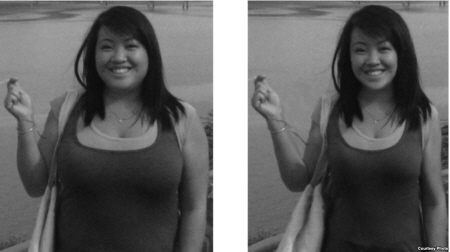
   |
[Headlines] (HL-정치/사회/경제) Overweight Asian-Americans Seen As More American
최고관리자 | 17-08-12 09:24

What does an American look like? Nearly 1,300 Americans, mostly college students, were asked that question for a recent study in Psychological Science. They were shown pictures of people and asked by University of Washington researchers who looked American to them. The most surprising answer was how people saw Asian-Americans. Over-weight Asian-Americans were more likely to be seen as Americans than normal weight Asian-Americans, the researchers said. Researchers who worked on the study believe this all fits into common stereotypes. A stereotype is a belief, often untrue, that many have about a group of people. And one common stereotype is that Asians are thin and most Americans are heavy, the researchers said.
* nearly = 거의/ Asian-American = 아시아계 미국인/ work on ~ = ~에 애쓰다[공들이다]/ fit into ~ = ~에 꼭 들어맞다, 적합[적응]하다; 어울리다/ stereotype = 고정 관념, 정형화된 생각[이미지]
Sapna Cheryan is a co-author of the study. She also teaches psychology at the University of Washington. She said the findings show an unusual benefit for overweight Asian-Americans. She noted that overweight people often face discrimination. But Cheryan said that being overweight makes Asian-Americans seen more American. That makes them less likely to face discrimination directed at those believed to be foreign, she said. Cheryan said her interest in ethnic and racial stereotypes goes back to her youth in Urbana, Illinois. She is Indian-American and remembers people would praise her mother because she “spoke English so well.” It was as if they did not expect a woman who appeared to come from a foreign country to speak English, she said. Cheryan also remembers worrying when friends would come over to her house. She was embarrassed that her family served Indian food. The food seemed “different” compared to American favorites such as pizza and Doritos. The research on how people see Asian-Americans is a follow-up of her 2011 research. It found Asian-Americans were three times as likely to order American food after being asked if they spoke English than if they had not been asked that question.
* findings = (주로 복수) (조사, 연구 등의) 결과[결론]/ overweight = 과체중의, 비만의/ face discrimination = 차별에 직면하다/ praise = 칭찬하다; (하느님을) 찬송[찬미]하다/ embarrassed = 쑥스러운, 어색한, 당황스러운/ follow-up = 후속 조치; 후속편
   |




